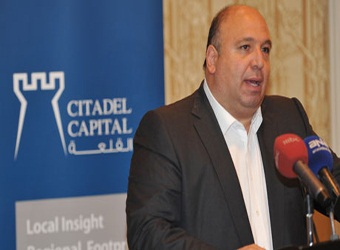Egypt’s Citadel Capital has three priorities for the current phase; divesting non-core assets, mitigating operational and financial risk; and emphasising the importance of governance, chairman Ahmed Heikal asserted on Wednesday.
“As we approach the closing of our capital increase later this week, Citadel Capital has exactly three priorities: the divestiture of non-core assets, the continued mitigation of operational and financial risk; and a very sharp emphasis on governance,” said Heikal.
This comes in the awake of Citadel Capital (CCAP.CA)’s recent hiring of its first dedicated Head of Internal Audit, deepening its investment in corporate governance systems as part of its institutionalization drive
“We expect Shady to make a very significant contribution to our institutionalization drive at both the firm and subsidiary level.” Heikal noted.
Shady Raphael brings broad industry experience to the firm, having earlier worked in the internal audit, assurance and finance functions in the pharmaceutical, audit and, most recently, telecommunications industries.
Citadel Capital is presently closing an EGP 3.64 billion capital increase that will see paid-in capital rise to EGP 8 billion as the firm acquires majority control of most of its core investments. The move comes as part of the firm’s transformation into an investment company with a focus on five core industries, including energy, transportation, agrifoods, mining and cement.
“On the divestiture front, we look forward to soon closing the sale of the Sudanese Egyptian Bank, the first of several non-core assets we aim to divest this year,” Heikal noted. “Proceeds from the exits of non-core holdings will, among other things, help us further mitigate risk by allowing us to optimize our debt structure, re-invest capital into our core-investments and generally strengthen our balance sheet.
“Shady’s hiring is one of several developments falling in the category of institutionalization as we look to back our team at the firm and subsidiary levels with the systems, policies and procedures they need to manage risk as they grow their businesses,” Heikal noted.
In keeping with global norms, Raphael will formally report to the audit committee of Citadel Capital’s board of directors, with a ‘dotted-line’ relationship to Heikal in his role as Chairman.
Said Raphael, “Our focus right now is on the rapid adoption of global best practices to set up the systems we need at the Citadel Capital level — starting with basic processes including the internal audit charter and anti-fraud policy — and extending into a deep risk assessment to define the areas in which management needs to focus. My role in this sense is to validate the policies, procedures and controls that will strengthen the firm’s ability to create and maximize stakeholder value.”
Raphael’s mandate will extend to the subsidiary level, where he will help ensure the dissemination of group policies and best practices and help institutionalize new internal audit functions. He will also sit as a member of the audit committee of subsidiaries that have already established such bodies.
“Fundamentally, my job is about institutionalization — to ensure the controls are in place to maintain and create stakeholder value through the institutionalization of proper control systems,” Raphael concluded.


